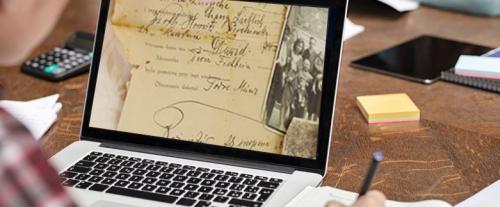Call for Proposals EHRI Workshop @Yad Vashem | Challenges in Presenting Holocaust Resources in the Digital Age

Initiatives in Accessibility to Holocaust Archival Sources and New Ways of Presenting Digital Archival Content
22-24 November 2022 | Location: Yad Vashem, Jerusalem, Israel | Submission Deadline: 1 September 2022
We would like to invite you to participate in an international workshop on initiatives in accessibility to Holocaust archival sources and new ways of presenting digital archival content, to be held at Yad Vashem in Jerusalem, on 22-24 November 2022.
This workshop is organized within the framework of the European Holocaust Research Infrastructure (EHRI) project, supported by the European Commission, together with the Foundation “Remembrance, Responsibility and Future” (EVZ Foundation), Berlin.
Collecting sources from the Holocaust period is the basis for research, education and commemoration. In the digital age, open, online access to this material has a key role in facilitating these activities. The gap between the amount of archival documentation amassed by Holocaust collection holding institutions and the rate at which this material is made available online has engendered conflicting views regarding the degree of information necessary for presenting the documentation in the proper context, i.e. extensive metadata vs. just getting the material out there with minimal descriptions/information. At the same time, the demand for online access has spurred the creation of innovative, new tools, platforms and resources for presenting digital archival content. These may take the form of traditional online archives with expanded search capabilities, including cross-database links, data visualization and more. Other initiatives encompass platforms that allow the user to contextualize, interpret and visualize Holocaust sources, for example:
- Archival storytelling via online exhibitions and other platforms, focusing on specific themes or events and incorporating a range of archival sources (photos, film footage, official documents, letters, diaries, video testimony, etc.);
- Annotated digitized documents from various sources, centering on a specific theme > Geo-mapping projects and other tools for the analysis and interpretation of Holocaust documentation;
- Open and flexible multidisciplinary interfaces such as the EHRI Document Blog, which provides an experimental space to discuss and test new digital approaches to Holocaust documentation;
- Archival sources-based educational tools.
The very accessibility of digital archival material brings about fresh challenges. Unlike in the past, access to the archival descriptions and scanned documents online creates an opportunity to democratize work with historical documentation. Audiences no longer, or at least not overwhelmingly, consist of scholars and students; rather, archives have an undefined audience whose members have varying levels of expertise, different expectations and cultural backgrounds. Holocaust-related archives have been active in efforts to ensure that documents are now available for study by everybody, enthusiast or professional, local or remote.
In this workshop we will showcase these initiatives, and generate discussions on the dilemmas and challenges regarding presentation, contextualization, intended target groups, and more. Additionally, we will explore these new tools in the service of Holocaust education. We will look at the use of tools in undergraduate Holocaust Studies courses that enable students to engage directly with primary sources, as well as the development of digital content and digital learning environments in the professional advancement of Holocaust educators.
Read the Call for Proposals
Image: Yad Vashem
